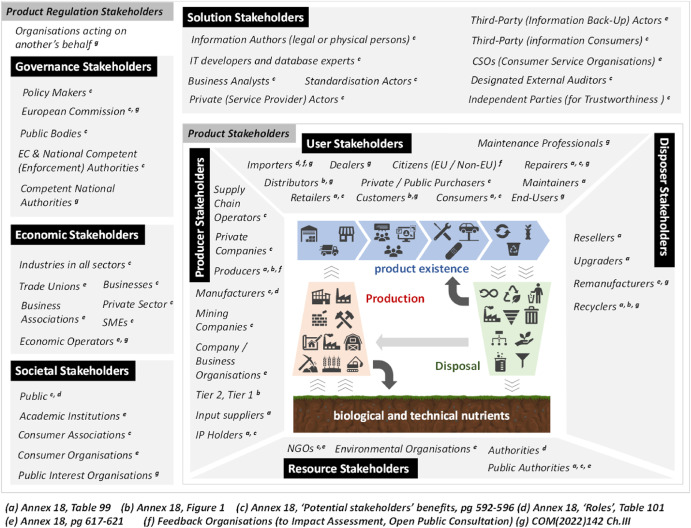Home
| About
| Mine Tracker
| RSS
| Footer
▄▄▄▄▄▄▄▄▄▄▄▄▄▄▄▄▄▄▄▄▄▄▄▄▄▄▄▄▄▄▄▄▄▄▄▄▄▄▄▄▄▄▄▄▄▄▄▄▄▄▄▄▄▄▄▄▄▄▄▄▄▄▄▄▄▄▄▄▄▄▄▄▄▄▄▄▄▄▄▄▄▄▄▄▄▄▄▄▄▄▄▄▄▄▄▄ █▄▄░▄▄█░▄▄▀█░▄▄▀█▀▄▀█░▄▄███░▄▄▀█░▄▄▀█░▄▀███▄▄░▄▄█░▄▄▀█░▄▄▀█▀▄▀█░▄▄█░▄▄▀█░▄▄▀██▄██░███▄██▄░▄█░██░ ███░███░▀▀▄█░▀▀░█░█▀█░▄▄███░▀▀░█░██░█░█░█████░███░▀▀▄█░▀▀░█░█▀█░▄▄█░▀▀░█░▄▄▀██░▄█░███░▄██░██░▀▀░ ███░███▄█▄▄█▄██▄██▄██▄▄▄███▄██▄█▄██▄█▄▄██████░███▄█▄▄█▄██▄██▄██▄▄▄█▄██▄█▄▄▄▄█▄▄▄█▄▄█▄▄▄██▄██▀▀▀▄ ▀▀▀▀▀▀▀▀▀▀▀▀▀▀▀▀▀▀▀▀▀▀▀▀▀▀▀▀▀▀▀▀▀▀▀▀▀▀▀▀▀▀▀▀▀▀▀▀▀▀▀▀▀▀▀▀▀▀▀▀▀▀▀▀▀▀▀▀▀▀▀▀▀▀▀▀▀▀▀▀▀▀▀▀▀▀▀▀▀▀▀▀▀▀▀▀
PDF; Towards a Digital Product Passport Fit for Contributing to a Circular Economy
https://www.mdpi.com/1996-1073/14/8/2289
The Digital Product Passport (DPP) is a concept of a policy instrument particularly pushed by policy circles to contribute to a circular economy. The preliminary design of the DPP is supposed to have product-related information compiled mainly by manufactures and, thus, to provide the basis for more circular products. Given the lack of scientific debate on the DPP, this study seeks to work out design options of the DPP and how these options might benefit stakeholders in a product’s value chain.
https://www.mdpi.com/1996-1073/14/8/2289
The Digital Product Passport (DPP) is a concept of a policy instrument particularly pushed by policy circles to contribute to a circular economy. The preliminary design of the DPP is supposed to have product-related information compiled mainly by manufactures and, thus, to provide the basis for more circular products. Given the lack of scientific debate on the DPP, this study seeks to work out design options of the DPP and how these options might benefit stakeholders in a product’s value chain.
Article: A proposed universal definition of a Digital Product Passport Ecosystem (DPPE): Worldviews,
https://www.sciencedirect.com/science/article/pii/S0959652622051125
This paper contributes new knowledge and understanding about the role that Product Passports might play in advancing sustainable business practices towards a Circular Economy. The significance of this research is the proposed universal definition of a Digital Product Passport Ecosystem (DPPE) for international policy, industrial and technical communities. The novelty of this research lies in the systems thinking approach, coupled with systems engineering, to define and model a DPPE as a System of Systems to derive a definition. Stakeholder perspectives and requirements concerning Product Passports were synthesised using data and analysis from the European Commission's (EC) open consultation on the Sustainable Products Initiative (SPI). Nine high-level capabilities of a DPPE have been identified, and each is explored by mapping a list of information requirements discussed within the consultation. It is shown that different Product Passport applications benefit (or detriment) different stakeholder groups.
https://www.sciencedirect.com/science/article/pii/S0959652622051125
This paper contributes new knowledge and understanding about the role that Product Passports might play in advancing sustainable business practices towards a Circular Economy. The significance of this research is the proposed universal definition of a Digital Product Passport Ecosystem (DPPE) for international policy, industrial and technical communities. The novelty of this research lies in the systems thinking approach, coupled with systems engineering, to define and model a DPPE as a System of Systems to derive a definition. Stakeholder perspectives and requirements concerning Product Passports were synthesised using data and analysis from the European Commission's (EC) open consultation on the Sustainable Products Initiative (SPI). Nine high-level capabilities of a DPPE have been identified, and each is explored by mapping a list of information requirements discussed within the consultation. It is shown that different Product Passport applications benefit (or detriment) different stakeholder groups.
CIRPASS; Digital Product Passport
https://cirpassproject.eu

A Digital Product Passport (DPP) is a structured collection of product related data with pre- defined scope and agreed data ownership and access rights conveyed through a unique identifier and that is accessible via electronic means through a data carrier. The intended scope of the DPP is information related to sustainability, circularity, value retention for re- use, remanufacturing, and recycling.
The DPP’s goals are: (1) enhancing sustainable production; (2) extending product lifetimes, optimising product use, and providing new business opportunities to economic actors through circular value retention and extraction; (3) supporting consumers in making sustainable choices; (4) enabling the transition to the circular economy by boosting materials and energy efficiency; and (5) supporting authorities to verify compliance. (European Commission).
https://cirpassproject.eu

A Digital Product Passport (DPP) is a structured collection of product related data with pre- defined scope and agreed data ownership and access rights conveyed through a unique identifier and that is accessible via electronic means through a data carrier. The intended scope of the DPP is information related to sustainability, circularity, value retention for re- use, remanufacturing, and recycling.
The DPP’s goals are: (1) enhancing sustainable production; (2) extending product lifetimes, optimising product use, and providing new business opportunities to economic actors through circular value retention and extraction; (3) supporting consumers in making sustainable choices; (4) enabling the transition to the circular economy by boosting materials and energy efficiency; and (5) supporting authorities to verify compliance. (European Commission).
Digital Product Passport (DPP)
https://www.digimarc.com/blog/decentralized-blueprint-digital-product-passports
The European Commission announced at the end of March 2022 its intention to make Digital Products Passports mandatory as soon as 2024 at least for all product categories regulated under the Ecodesign for Sustainable Products Regulation. Additional delegated acts issued by the EU specify the Digital Product Passport requirements for specific product categories (e.g. starting with Electric Vehicle batteries, textiles, construction materials, consumer electronics, packaging, food). The aim of these passports is to track, process, and share information to make consumer products longer-lasting, easier to repair and recycle, and cleaner in terms of usage of environmentally-friendly materials, enhancing the overall environmental sustainability of products placed on the European market.
https://www.digimarc.com/blog/decentralized-blueprint-digital-product-passports
The European Commission announced at the end of March 2022 its intention to make Digital Products Passports mandatory as soon as 2024 at least for all product categories regulated under the Ecodesign for Sustainable Products Regulation. Additional delegated acts issued by the EU specify the Digital Product Passport requirements for specific product categories (e.g. starting with Electric Vehicle batteries, textiles, construction materials, consumer electronics, packaging, food). The aim of these passports is to track, process, and share information to make consumer products longer-lasting, easier to repair and recycle, and cleaner in terms of usage of environmentally-friendly materials, enhancing the overall environmental sustainability of products placed on the European market.